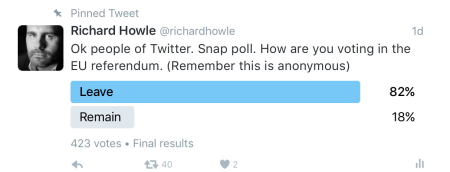Last week I wrote about why booking fees are important where I explained how booking fees brought a transparency to ticketing that helped the consumer to make informed purchasing decisions. So it seems a little contradictory to be writing this week that we should end booking fees. But, whilst I stand by what I wrote, I really don’t think that it is enough to gain the confidence of the ticket buying public. Although that explanation may help consumers understand why there are booking fees, it won’t convince them that they aren’t being ripped off. As I said, no one likes booking fees – given the choice ticketing companies would get rid of them, after all why have a policy that so infuriates your customers if there was another way?
As I have discussed on these pages before, Ticketing never receives positive headlines. It is never going to be a popular industry, at best it is just a necessary evil in order for fans to access their favourite artists, sports people, shows or events; And when demand outstrips supply, it is the Ticketing Industry that bears the brunt of the public’s wrath.
The perils of being the gatekeeper are just something the Ticketing Industry will have to put up with, there is nothing that it can do about that. But it can and should eliminate some of the other practices that make it so unpopular. There is no need to unnecessarily alienate so many people with outdated policies and unjustifiable charges. Ticketing is a service industry and we should always remember that. Whilst the Ticketing Industry is never going to be popular, it would be considered more favourably if we adopted the following:
End the no exchanges and refunds policy. This is a policy formed entirely out of self interest. The theory behind it is that once a ticket is sold decisions about marketing and pricing as well as operational decision are made on the basis of that sale. I.E. If an event has sold 1,000 tickets then the organisers will make financial decisions based on those sales. If 500 of those tickets were to be returned then those decisions may no longer be the correct ones and may cost the organiser money, particularly if those tickets are returned at a time too late to resell them (or after the advertising budget has been spent). This is all well and good and are legitimate concerns but there must be an alternative that can meet those concerns without alienating customers. Because, for customers, this is a serious issue. In most other areas of retail a customer can return an unused product if they have changed their mind – as a minimum to exchange it for another product or a credit note. The Ticketing Industry is already given protection in the form of exclusion from the distance selling legistlation that allows consumers a 14 day window in which to change their mind and get a refund, its refusal to allow exchanges often leaves consumers with an expensive purchase that they can no longer use. Rather than a blanket ban, if customers are allowed to exchange their tickets for an alternative date, for a fee (recognising that there is an admin cost) within a set time period (recognising the concerns of the event organiser) then not only is the customer happier, but it might also make them more confident about booking in advance. When there aren’t alternative dates there should be a resale option which offers to resell tickets on behalf of customers (provided that all other tickets are sold etc).
Be transparent about the secondary market. Currently the refusal to provide exchanges or refunds only provides fuel for the secondary sites such as Stubhub or Viagogo. By offering official resale channels (at face value with nominal admin charges) they would eliminate the need for people to operate on these sites. This is important because the Secondary Ticketing market is one of the biggest causes of public resentment towards the Ticketing Industry.
In a free market economy people should be free to buy and sell tickets at whatever price they wish to. But there needs to be transparency about who is selling the tickets, particularly if they are coming from event organisers or primary ticketing companies. Those event organisers who do not wish for their tickets to be sold via these sites should stop the supply of them, not punish the customer who bought the tickets by cancelling them.
Make it cheaper online. Although, as I explained last week, it does cost money to sell tickets, it is undoubtedly cheaper to do so online. A ticket is one of the only products where it is more expensive to purchase online. There is no excuse for savings not to be passed on to the consumer
Stop the fees altogether. One of the bug bears of consumers isn’t the existence of booking fees, per se but it is the layering of fees (facility fee, booking fee, print at home fee, transaction fee). The reason why ticketing companies do this is to make the individual components appear smaller, rather than just having one, bigger fee. They should just bite the bullet and be honest about what it costs to sell tickets. Or rather still we should just eliminate fees altogether.
Ticketing fees should all be absorbed into the ticket price with ticketing companies buying tickets from event organisers at a negotiated wholesale price and sold at or around an agreed recommended retail price. Ticketing companies can negotiate their margin based on a mixture of volume and distribution opportunities, without it being played out in public – confusing and causing disillusionment in ticket buyers.
This is what the public wants and as a service industry this is what we should give them. However, for the public it will be a question of being careful of what you wish for because there will be two direct consequences.
1. It will make ticket buyers more vulnerable to being ripped off by rogue companies (see my previous post), the industry will also need to be much clearer about who are legitimate, authorised sellers and what consumers should expect to pay for different tickets.
2. It will put prices up for everyone. By eliminating booking fees it wont eliminate the cost of ticketing. By absorbing the cost of ticketing within the ticket price it will only raise those prices for everybody. This will particularly be felt by those who buy tickets via sales channels that don’t currently incur booking fees now (such as in person sales at the box office). The current face values would likely become wholesale prices with retail prices being 10-15% higher.
The higher ticket prices would then mean that a lot of the wrath of the ticket buying public would then move to the event organiser. Which is why, in reality, none of these things will actually happen.
You see, whilst not perfect, the Ticketing Industry is really the fall guy for event organisers. They, rather than the public, are its paymasters. They are the ones for whom the Ticketing Industry provides a service. The Ticketing Industry takes the blame and the public flack for the decisions of the event organisers.
Refunds and exchanges. It really makes very little difference to the Ticketing Companies whether there are refunds or exchanges. Yes there is are some administration costs to doing so, which can be covered, but actually they pail into insignificance compared to the cost of dealing with the consequences of that policy from handling complaints right through to the reputational damage. A senior executive at a ticketing company told me recently that after a customer had complained so much they decided to refund the customer (at their own cost) in order to resolve the issue. The customer then tweeted that they had received a refund. Having read this, the promoter contacted the ticketing company demanding to know why a refund had been made without his permission. From a ticketing company’s point of view it would make life easier, enable them to have better relations with their customers and gather more data from additional customers (a consequence of reselling tickets) if event organisers allowed refunds / exchanges.
Secondary market. It is an open secret that some event organisers supply tickets directly to the secondary market in order to boost their income. The cloak of anonymity then allows them to decry the practice in public and lambast the Ticketing Industry that allows this to happen.
Booking fees. All ticketing companies would choose, if they could, not to have booking fees. It is the event organiser that decides otherwise. They are presented with the costs of ticketing and then choose to pass those costs on to their public (blaming the ticketing industry on the way). Of course, they should view the cost of ticketing as just another cost of putting on the event – they wouldn’t expect the customers to buy a ticket to an event with an additional lighting charge to pay for the costs of lighting that event.
So whilst the Ticketing Industry may wish to better serve the public it will often find that its hands are tied by policies which aren’t theirs but those of the people who have engaged them to sell tickets.
Many event organisers will say that they don’t have any choice and are unable to change the way tickets are sold because they don’t have enough clout on their own to take a stance. That may well be true but if we, as a live entertainment industry, continue to alienate those people who support our businesses by buying tickets, then we risk biting the hand that feeds us. And, if the Ticketing Industry really wanted to make a difference it could take a stance and demand a better service for their customers from event organisers.
Whoever takes the lead, it is time for us all to engage in some sensible, adult, conversations and to make some changes that ensure that it is the events that make the headlines, not the ticketing.


